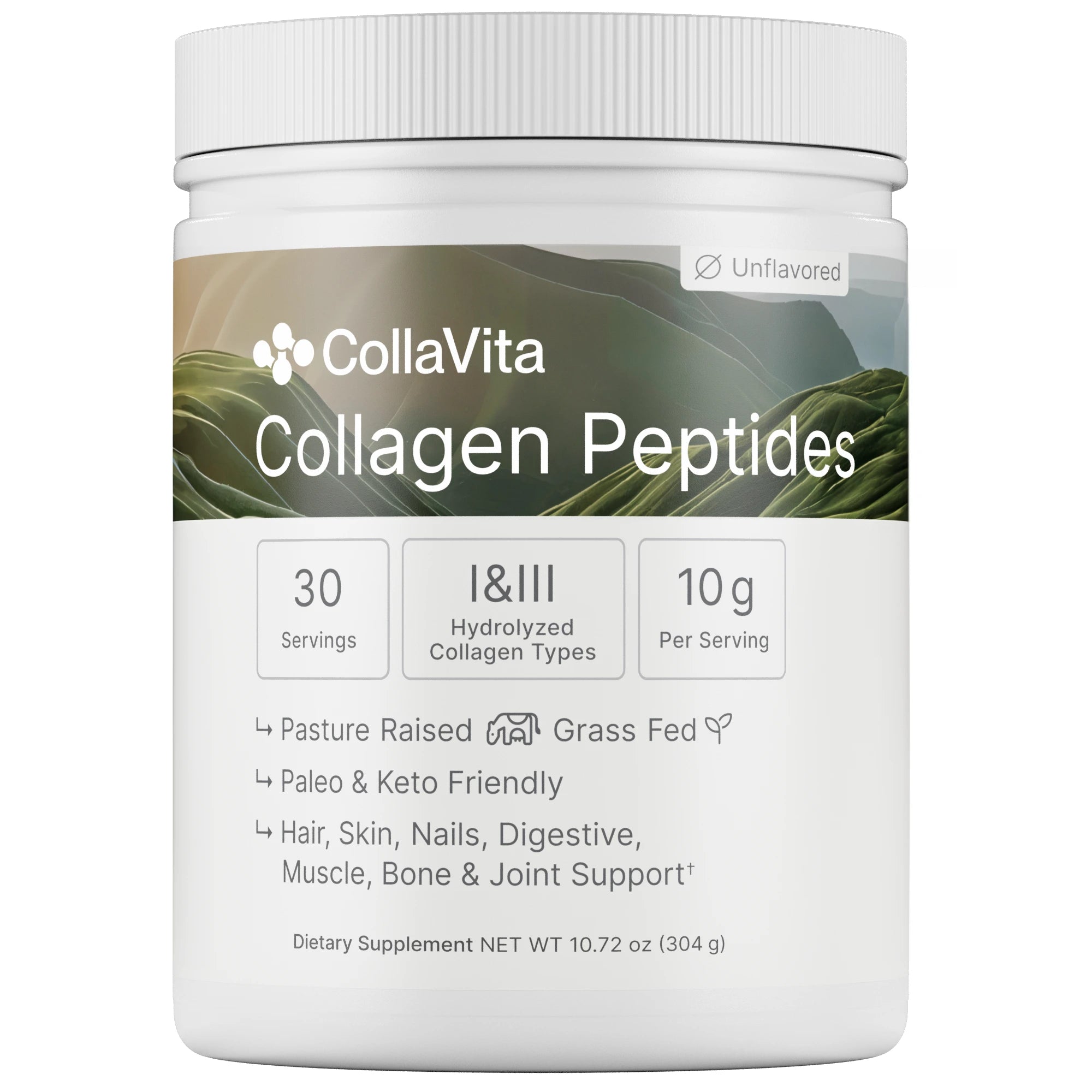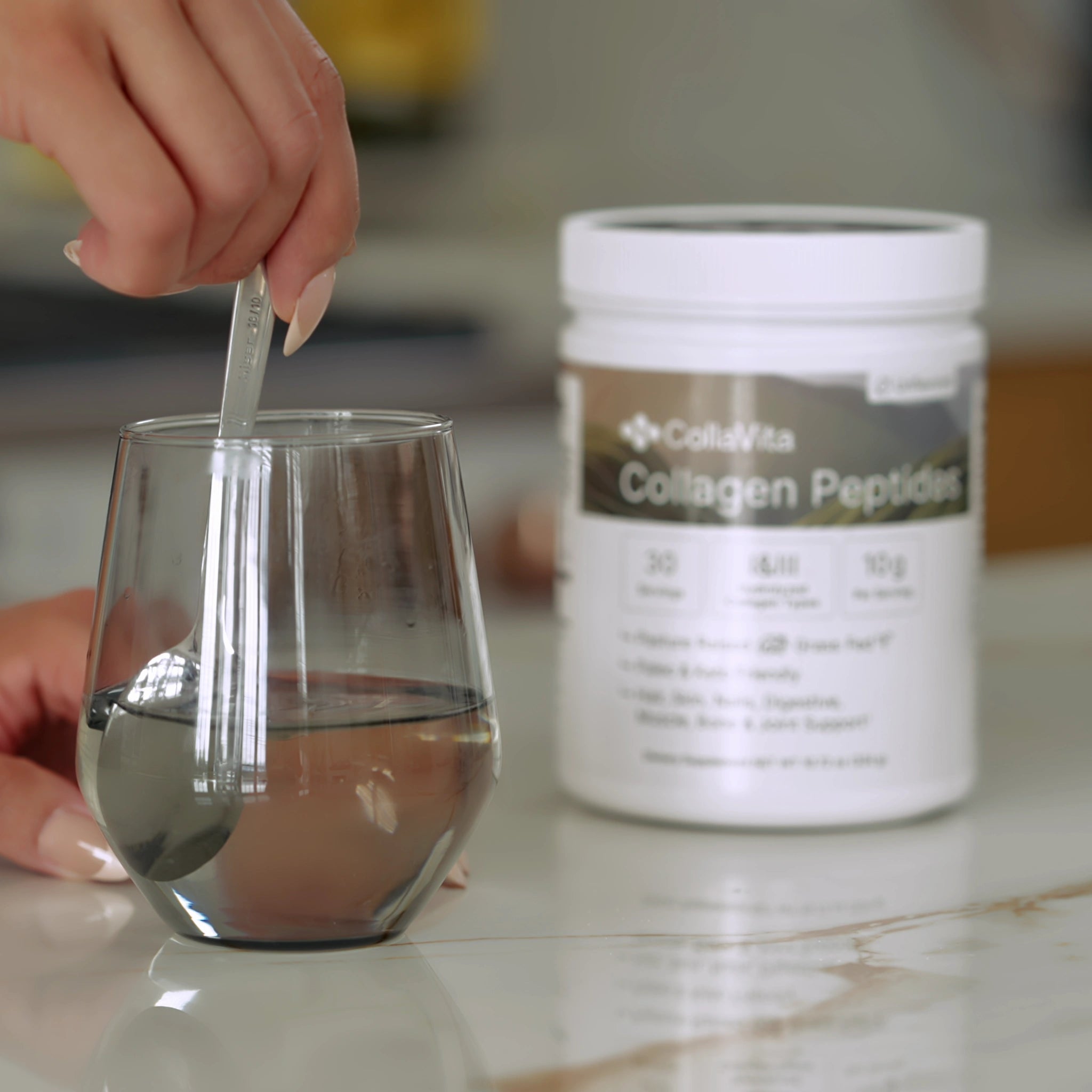Top Foods Rich in Collagen
To meet your collagen needs through diet, focus on two main principles:
- Eat foods high in collagen: After digestion, your body turns these foods into collagen.
- Boost collagen production: Plant-based foods provide nutrients like vitamin C, iron, and zinc, which support your body’s natural collagen production.
Hydrolyzed collagen, often found in cartilage and skin, contains peptides that support joint health and cartilage repair. A 2023 study in Nutrients found that these peptides are highly bioavailable and can help with joint function and repair by stimulating cartilage cells(1).
Tip: For best results, pair collagen-rich foods with vitamin C, which helps your body absorb and use the collagen efficiently.
1. Bone Broth
Bone broth is a great source of collagen and can help replace the daily loss of collagen as you age, especially after 40. One glass of bone broth contains 5 to 10 grams of collagen, which is more than enough to meet the daily need.
Bone broth is made by cooking animal bones and tissues for hours. It contains collagen and important amino acids like glycine and proline. 
2. Fish and Seafood
Fish and seafood are good for your heart and your skin. The omega-3 fatty acids in fish help keep your skin hydrated and protect it from damage. Omega-3s also help slow down collagen loss by reducing inflammation. You might start seeing results after about 8 weeks of eating fish regularly.
Fish collagen is utilized in medicine, particularly within the biomedical field, including applications such as wound healing and tissue repair. A 2024 review published in Marine Drugs examined its biomedical applications in detail, indirectly supporting its relevance to these therapeutic areas(2).
Fish collagen is also great for your skin. It helps keep your skin moisturized, reduces wrinkles, and improves skin elasticity. A 2024 study in Nutrition Research Practice showed that fish collagen can help with skin aging and health(3).

3. Chicken
Chicken, especially the cartilage from chicken, is a great source of collagen for your joints. When you cook chicken for a long time, it releases collagen that is good for your joints. This collagen helps protect your joints and keep them healthy.
Hydrolyzed chicken collagen (broken down collagen) is especially helpful for joint pain. A 2021 study in Nutrients found that hydrolyzed chicken collagen reduced joint pain and stiffness, making it useful for people with arthritis(4).
A 2020 systematic review published in Rheumatology and Therapy found evidence supporting the beneficial effects of collagen derivatives on joint health and cartilage repair(5). However, it was not a cohort study but rather a synthesis of existing research.

4. Egg Whites
Egg whites contain two key amino acids, proline and hydroxyproline, which help the body produce and maintain collagen. These amino acids also support skin hydration and prevent collagen breakdown. Additionally, the thin membrane inside eggshells is rich in collagen.
A 2022 study in the Journal of Foods found that eggs help build muscle and reduce fatigue(6). However, no substantial evidence exists that eggs provide instant skin benefits.
For the best health benefits, boil eggs instead of frying them to keep their nutrients intact.

5. Citrus Fruits
Vitamin C is essential for collagen production. Without enough vitamin C, your body cannot make or absorb collagen properly. It works like a "glue," helping amino acids form collagen structures. Minerals like copper and zinc also support this process.
A 2018 study in the Orthopaedic Journal of Sports Medicine showed that vitamin C boosts Type I collagen production and helps repair bones(7).
To maintain healthy collagen levels, eat plenty of oranges, lemons, grapefruits, and other vitamin C-rich foods.

Why Should You Include Collagen in Your Diet?
Your body starts losing collagen after mid-20s, but aging isn’t the only reason. Too much sun, stress, and illness can also speed up collagen loss. Since collagen is rich in glycine, your body uses it quickly when under stress, leading to breakdowns in skin, joints, and even internal organs.
Without enough collagen, the first signs appear on your skin; wrinkles, dryness, and loss of elasticity. Then, joint pain and stiffness may follow. If collagen levels drop too low, it can even affect your internal organs.
Most collagen comes from animal sources, but a balanced diet should also include plant-based foods that support collagen production. However, just eating collagen-rich foods doesn’t mean your body will fully absorb or use them.
How to Incorporate These Foods into Your Diet?
For collagen to benefit the body, it must be broken down into small pieces that the intestines can absorb. If the molecules are too large, they won’t be useful.
Collagen peptides with a low molecular weight (2,000-3,500 Daltons) are easier for the body to absorb and help with muscle repair and growth. A 2024 study in the Journal of Nutrients highlights their role in improving muscle health(8).
To break collagen into an absorbable form, animal-based sources must be cooked for a long time. Whole chickens contain a lot of collagen, but boiling them for at least six hours helps break it down. Bone broth should be simmered for at least eight hours to extract collagen effectively.
Taking 5-15 grams of collagen daily has been linked to reduced joint pain and better movement. A Journal of Amino Acids study(9) that reviewed 856 research papers found that combining collagen with resistance training improves body composition and strength, especially in young, active people.
Vitamin C and exercise boost collagen production. Studies suggest that 15 grams of collagen per day is more effective than 5 grams. It’s also best to take collagen about 60 minutes before exercise for maximum benefits.
Frequently Asked Questions about Collagen-Rich Foods
The following are some frequently asked questions and answers about collagen-rich foods.
What are the Best Sources of Natural Collagen?
Poultry, shellfish, and beef are the richest sources of collagen. Collagen, on the other hand, must be consumed from the scalp to the skin for it to be effective. The skin, muscles, and joints all need collagen, and its sources are pretty much where you'd expect them to be. It is present in the skin, muscles, and joints.
Can Collagen-Rich Foods Help with Aging Skin?
Yes, eating collagen-rich foods can help to slow down the signs of aging skin. However, for this, you ought to take in type 1 and type 3 collagen, which are contained in our skin. They tend to be found in seafood. However, meals high in type 2 collagen, such as chicken and beef, can help to reduce wrinkles on the skin. Our skin includes a considerable quantity of type 2 collagen, highlighting one of the many collagen benefits for maintaining a youthful appearance.
Can Vegetarians or Vegans Boost their Collagen Levels Through Diet?
Vegetarians can also increase their collagen levels with ease. In the same way as herbivores like cows and sheep get their high collagen levels from eating just plant meals, collagen for vegetarians or vegans can be obtained from amino acids present in plants. These amino acids are hydroxyproline, proline, lysine, and glycine. collagen for vegetarians or vegans
You can find a lot of these amino acids in root vegetables, such as beets and leeks. Some examples of animal products that are rich in collagen are aged cheeses, Parmesan cheese, and A2 dairy products. Nuts and avocados are another two more foods that boost collagen levels. On top of that, amino acid supplements like glycine, proline, and lysine can help you increase your collagen levels.
Conclusion:
If you're in your 40s or older, collagen is essential for maintaining healthy skin, joints, and overall well-being. As you age, your body produces less collagen, making it even more important to include it in your diet.
To get the most benefits, focus on consuming collagen in a form your body can absorb. This means choosing hydrolyzed collagen or preparing collagen-rich foods properly slow cooking or simmering bone broth for several hours helps break it down.
Certain herbs and nutrients, like vitamin C, zinc, and copper, can also boost collagen production. Without these, your body may struggle to use the collagen you consume effectively. By combining collagen-rich foods with the right nutrients and cooking methods, you can better support your body’s natural collagen levels.
SOURCES
(1) - Martínez-Puig, D.; Costa-Larrión, E.; Rubio-Rodríguez, N.; Gálvez-Martín, P. Collagen Supplementation for Joint Health: The Link between Composition and Scientific Knowledge. Nutrients 2023, 15, 1332.
(2) - Gaikwad, S.; Kim, M.J. Fish By-Product Collagen Extraction Using Different Methods and Their Application. Mar. Drugs 2024, 22, 60.
(3) - Lee JS, Yoon YC, Kim JM, Kim YH, Kang YH, Shin YC. Liquid collagen from freshwater fish skin ameliorates hydration, roughness and elasticity in photo-aged skin: a randomized, controlled, clinical study. Nutr Res Pract. 2024 Jun;18(3):357-371. doi: 10.4162/nrp.2024.18.3.357. Epub 2024 May 17. PMID: 38854476; PMCID: PMC11156766.
(4) - Mohammed A, He S. A Double-Blind, Randomized, Placebo-Controlled Trial to Evaluate the Efficacy of a Hydrolyzed Chicken Collagen Type II Supplement in Alleviating Joint Discomfort. Nutrients. 2021 Jul 18;13(7):2454. doi: 10.3390/nu13072454. PMID: 34371963; PMCID: PMC8308696.
(5) - Honvo G, Lengelé L, Charles A, Reginster JY, Bruyère O. Role of Collagen Derivatives in Osteoarthritis and Cartilage Repair: A Systematic Scoping Review With Evidence Mapping. Rheumatol Ther. 2020 Dec;7(4):703-740. doi: 10.1007/s40744-020-00240-5. Epub 2020 Oct 17. PMID: 33068290; PMCID: PMC7695755.
(6) - Matsuoka, R.; Sugano, M. Health Functions of Egg Protein. Foods 2022, 11, 2309.
(7) - DePhillipo NN, Aman ZS, Kennedy MI, Begley JP, Moatshe G, LaPrade RF. Efficacy of Vitamin C Supplementation on Collagen Synthesis and Oxidative Stress After Musculoskeletal Injuries: A Systematic Review. Orthop J Sports Med. 2018 Oct 25;6(10):2325967118804544. doi: 10.1177/2325967118804544. PMID: 30386805; PMCID: PMC6204628.
(8) - Inacio, P.A.Q.; Gomes, Y.S.M.; de Aguiar, A.J.N.; Lopes-Martins, P.S.L.; Aimbire, F.; Leonardo, P.S.; Sá Filho, A.S.; Lopes-Martins, R.A.B. The Effects of Collagen Peptides as a Dietary Supplement on Muscle Damage Recovery and Fatigue Responses: An Integrative Review. Nutrients 2024, 16, 3403.
(9) - Khatri, M., Naughton, R.J., Clifford, T. et al. The effects of collagen peptide supplementation on body composition, collagen synthesis, and recovery from joint injury and exercise: a systematic review. Amino Acids 53, 1493–1506 (2021).
Scientifically Reviwed by Omer (Matt) Sermet

















